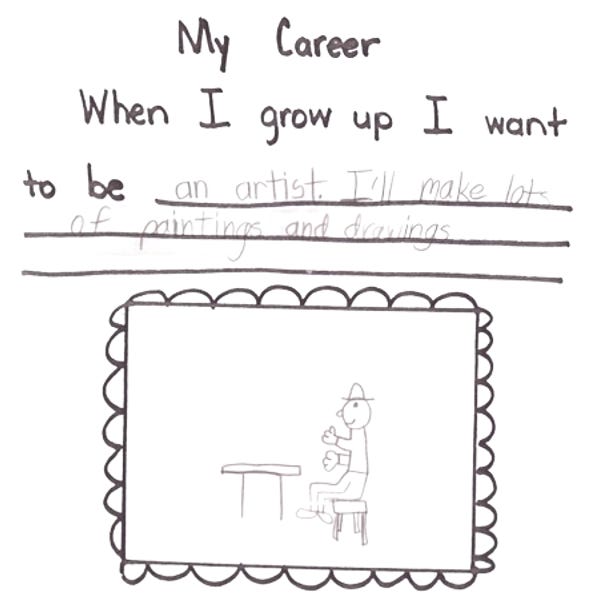Praise for the generalist.

On wearing many hats, many of them dumb looking.
There’s this pressure most of us feel to figure out our “one thing.”
What’s your major going to be? What career do you want? What's your passion? What do you want to be when you grow up?

Our culture loves stories about specialists: the violin prodigy, the tech genius, the youngest chess grand master, the gold medal athlete who started training at age five.
Specialists and their stories are neatly packaged up to inspire people who have been sold the notion that we're all born with some innate purpose far "greater" (see also: "more profitable" or "more useful to someone") than ourselves.
If you find yours, then you, too, can have a life that looks like all of the other ones around you! You, too, can feel "normal." You can feel like you belong.
The shadow assumption lurking behind that line of logic is, of course: "Everyone else with a life that looks like that already found their one thing. Why can't you?"
Why can’t you?
I tried. I really did.
I tagged myself with socially-compatible metadata for "what I do," based on the things that excited me, and I expended an ungodly amount of effort to make them useful to the rest of the world in the most practical, pragmatic, and valuable ways possible.
(Aspiring) Architect. Designer. Copywriter. Storyteller. Advisor. Senior Communications Specialist. (Their job title pick, not mine, and against my objection.)
They all felt like hats I wore more than a description of the person wearing them. Poorly fitted hats. Not even cool hats.
More like beanies with the little propellers on top, because I knew I was dumbing myself down to fit neatly into unimaginative, ineffective, and sometimes terminally stupid ways of doing things.
Was this somehow my fault? Was I was scattered? Indecisive? Afraid of commitment? Why couldn’t I find my "one thing" and just do it the way everyone else seemed to?
The four-star generalist
It took decades for me to realize that even though I was a failure as a specialist, I was also succeeding wildly at being a generalist.
I've been told many times that a generalist is a jack of all trades and master of none. But I’d argue that a good generalist is a master of one particularly rare skill: context.
Generalists aren’t tied to any one puzzle piece or any one machine; they’re looking at the lines in between the puzzle pieces and the gears, and how they fit into each other, and how different arrangements affect the larger whole.
Generalists understand how the pieces, and their placements, and their movements affect that larger whole, even if they don't know as much as the specialists do about how the pieces themselves are made or how they individually work.
Generalists see patterns in everything and relationships between everything; or maybe the ability to see them is what makes someone a generalist to begin with. Engineering looks like art, science looks like a story, and business, more often than not, looks like a clown show at the county fair.
Specialization offers stability in "normal" circumstances (although there are far fewer of those than there used to be), while generalists develop resilience, adaptability, and foresight in the disorder and chaos that arises from the absence of such “normal” circumstances in their lives.
When hell breaks loose, generalists break it back.
And it’s a good thing generalists have those traits, because holy hell are they going to need them. It turns out disorder and chaos are part of the everyday state of things, and if you hadn’t noticed yet, that’s probably thanks to a generalist.
Unfortunately for the generalist’s social standing, when things run smoother than they could have, when a situation is calmly stabilized before it became unrecoverable, or when you find a way to dig the tunnel before they flatten themselves against the picture of it on the wall, Wile E. Coyote-style, few people notice, and even fewer people appreciate how bad it could've been.
Nothing about being a generalist is glamorous. It’s just necessary. Nobody sees a generalist's skill set or the resilience that comes with it until they need the benefit of both, and that's a real tight turnaround for such a diverse skill set so the people who already have it get stuck cleaning up the mess.
The specialist still gets the spotlight for the end result, while the generalist just keeps on plugging away at the process. It's the group project dynamic all over again -- or rather, it's what that lesson was really about all along. I get it now.
Specialists are the stars of the show, standing center stage under the bright lights. They shine because their contributions are tied to a singular, show-stopping moment: a dazzling solo, a breathtaking feat, a perfectly executed finale, and beautifully designed product. It's easy to celebrate what happens in the spotlight because the outcome is polished, dramatic, and undeniable. Their role is built for visibility and measured in ovations, awards, five stars, and thumbs up.
But that spotlight comes with a price. Specialists build their confidence on the stability of their role, the safety of excelling in one thing, and the reassurance that the world values their skills.
When things go wrong, it can shatter that sense of invincibility that comes with the spotlight. Specialists suddenly confronted with failure or fragility have to grapple with fear and shame at the revelation that their safe and stable thing might not be as safe or stable as they believed it was.
Generalists, by comparison, are the unappreciated crew behind the scenes. Their work is not tied to a single dazzling moment, but to the messy ongoing process of ensuring the show goes on. The generalist’s moment to truly shine rarely comes, but when it does, it's usually when something is going catastrophically wrong. It is in these moments that generalists reveal just how indispensable they are.
Vulnerability in specialization
Their rare high-visibility triumphs can put specialists in a place of discomfort, causing them to feel exposed by the generalist’s ability to pivot, adapt, and thrive in a situation that feels, to them, like a failure and a risk to their own stability.
While generalists might feel empathy for the fear and shame specialists experience in situations like that, because generalists have always lived with the uncertainty specialists are just now confronting, it may not even occur to them that it’s a new or rare experience for some people.
The specialists quietly go back to their work, reluctant to endure their vulnerability any longer than they have to, and believing that avoiding it has no downside for them.
The generalists, for the most part, have long given up on begging for respect they know they will never get from a culture of performative perfection that will pretend not to know what they're talking about.
The divide usually doesn't get discussed because, well, we don't know what we don't know.
I don't begrudge specialists for this situation. After all, generalists love a good show, hate when things go poorly for others, and despise the spotlight because we know we don’t belong there. I know the status quo is not due to malice, but a lack of awareness brought about by prioritizing profitable “events” over everything, including empathy and understanding.
What I do resent is that our society only knows how to treat one like it's deserving of a "normal" life, even as things get less normal an alarming rate. The need for generalists to step in and do their thing has never been higher, but the opportunities for us to help never come about due to widespread cultural ignorance.
I’m not sure how to wrap this up, and I’m fine with that: Generalists are used to messy work that’s never quite finished. There is no neatly packaged finished product here.
There is only the hope that a few people will recognize this divide the next time they see it, and try to do something positive in their own way with that awareness.